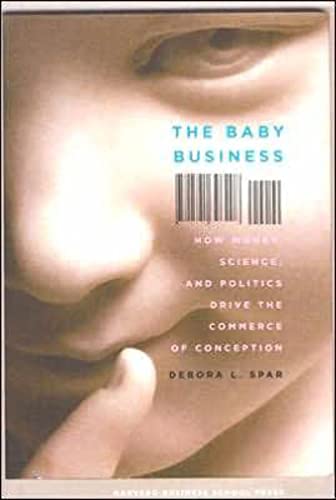Items related to The Baby Business: How Money, Science, and Politics...

In The Baby Business, Debora Spar argues that it is time to acknowledge the commercial truth about reproduction and to establish a standard that governs its transactions. In this fascinating behind-the-scenes account, she combines pioneering research and interviews with the industry’s top reproductive scientists and trailblazers to provide a first glimpse at how the industry works: who the baby-makers are, who makes money, how prices are set, and what defines the clientele. Fascinating stories illustrate the inner workings of market segments--including stem cell research, surrogacy, egg swapping, designer babies,” adoption, and human cloning--as Spar explores the moral and legal challenges that industry players must address.
The first purely commercial look at an industry that deals in humanity’s most intimate issues, this book challenges us to consider the financial promise and ethical perils we’ll face as the baby business moves inevitably forward.
"synopsis" may belong to another edition of this title.
Reviewed by David Plotz
Copyright 2006, The Washington Post. All Rights Reserved.
"About this title" may belong to another edition of this title.
- PublisherHarvard Business Review Press
- Publication date2006
- ISBN 10 1591396204
- ISBN 13 9781591396208
- BindingHardcover
- Edition number1
- Number of pages302
- Rating
Buy New
Learn more about this copy
Shipping:
US$ 4.30
Within U.S.A.
Top Search Results from the AbeBooks Marketplace
The Baby Business: How Money, Science, and Politics Drive the Commerce of Conception
Book Description Hardcover. Condition: new. Excellent Condition.Excels in customer satisfaction, prompt replies, and quality checks. Seller Inventory # Scanned1591396204
The Baby Business: How Money, Science, and Politics Drive the Commerce of Conception
Book Description Hardcover. Condition: new. New. Fast Shipping and good customer service. Seller Inventory # Holz_New_1591396204
The Baby Business: How Money, Science, and Politics Drive the Commerce of Conception
Book Description Hardcover. Condition: new. New Copy. Customer Service Guaranteed. Seller Inventory # think1591396204
The Baby Business: How Money, Science, and Politics Drive the Commerce of Conception
Book Description Condition: new. Seller Inventory # FrontCover1591396204
The Baby Business: How Money, Science, and Politics Drive the Commerce of Conception
Book Description Hardcover. Condition: new. New. Seller Inventory # Wizard1591396204
The Baby Business: How Money, Science, and Politics Drive the Commerce of Conception
Book Description Condition: new. Seller Inventory # Hafa_fresh_1591396204
The Baby Business Format: Hardcover
Book Description Condition: New. Brand New. Seller Inventory # 1591396204
The Baby Business: How Money, Science, and Politics Drive the Commerce of Conception by Spar, Debora L. [Hardcover ]
Book Description Hardcover. Condition: new. Seller Inventory # 9781591396208
The Baby Business. How Money, Science, and Politics Drive the Commerce of Conception.
Book Description Condition: New. Advances in reproductive medicine have created an undeniable 'market for babies', in which parents choose traits, clinics woo clients, and specialised providers earn millions of dollars a year. This book argues that it is time to acknowledge this largely secretive and controversial market as a commercial industry. Num Pages: 298 pages. BIC Classification: JHBK; KC. Category: (P) Professional & Vocational. Dimension: 242 x 165 x 24. Weight in Grams: 634. . 2006. Hardback. . . . . Seller Inventory # V9781591396208
The Baby Business. How Money, Science, and Politics Drive the Commerce of Conception.
Book Description Condition: New. Advances in reproductive medicine have created an undeniable 'market for babies', in which parents choose traits, clinics woo clients, and specialised providers earn millions of dollars a year. This book argues that it is time to acknowledge this largely secretive and controversial market as a commercial industry. Num Pages: 298 pages. BIC Classification: JHBK; KC. Category: (P) Professional & Vocational. Dimension: 242 x 165 x 24. Weight in Grams: 634. . 2006. Hardback. . . . . Books ship from the US and Ireland. Seller Inventory # V9781591396208

